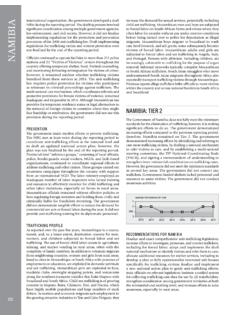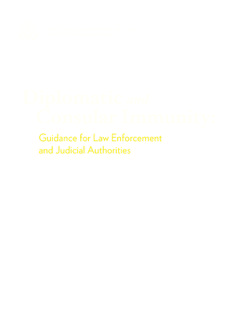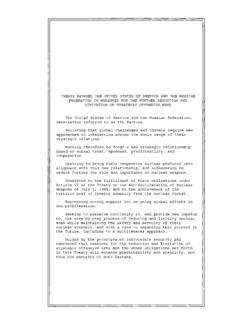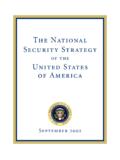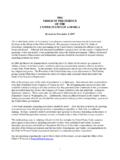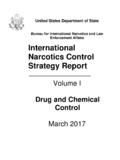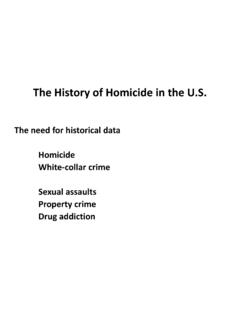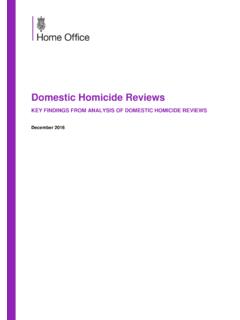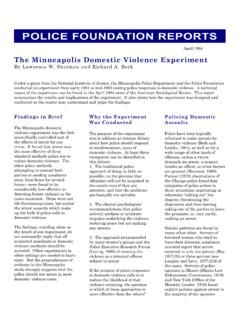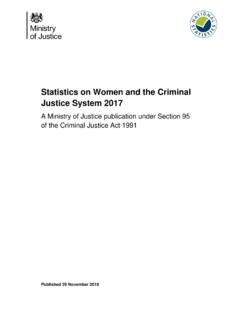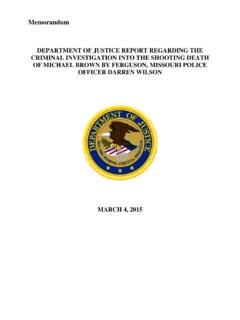Transcription of BRAZIL 2020 HUMAN RIGHTS REPORT
1 BRAZIL 2020 HUMAN RIGHTS REPORT EXECUTIVE SUMMARY BRAZIL is a constitutional, multiparty republic governed by a democratically elected government. In 2018 voters chose the president, the vice president, and the bicameral national legislature in elections that international observers reported were free and fair. The three national police forces--the Federal Police, Federal Highway Police, and Federal Railway Police--have domestic security responsibilities and REPORT to the Ministry of Justice and Public Security (Ministry of Justice). There are two distinct units within the state police forces: the civil police, which performs an investigative role, and the military police, charged with maintaining law and order in the states and the Federal District. Despite the name, military police forces do not REPORT to the Ministry of Defense. The armed forces also have some domestic security responsibilities and REPORT to the Ministry of Defense. Civilian authorities at times did not maintain effective control over security forces.
2 Members of the security forces committed numerous abuses. Significant HUMAN RIGHTS issues included: reports of unlawful or arbitrary killings by police; harsh and sometimes life-threatening prison conditions; arbitrary arrest or detention; violence against journalists; widespread acts of corruption by officials; lack of investigation of and accountability for violence against women; violence or threats of violence motivated by anti-Semitism; crimes involving violence or threats of violence targeting members of racial minorities, HUMAN RIGHTS and environmental activists, indigenous peoples and other traditional populations, and lesbian, gay, bisexual, transgender, or intersex persons. The government prosecuted officials who committed abuses; however, impunity and a lack of accountability for security forces was a problem, and an inefficient judicial process at times delayed justice for perpetrators as well as for victims. Section 1. Respect for the Integrity of the Person, Including Freedom from: a.
3 Arbitrary Deprivation of Life and Other Unlawful or Politically Motivated Killings There were numerous reports that state police committed unlawful killings. In some cases police employed indiscriminate force. The nongovernmental BRAZIL 2 Country Reports on HUMAN RIGHTS Practices for 2020 United States Department of State Bureau of Democracy, HUMAN RIGHTS and Labor organization (NGO) Brazilian Public Security Forum reported police killed 5,804 civilians in 2019, compared with 6,160 civilians in 2018. Rio de Janeiro State was responsible for 30 percent of the national total, despite representing just 8 percent of the population. Those killed included criminal suspects , civilians, and narcotics traffickers who engaged in violence against police. Accordingly, the extent of unlawful police killings was difficult to determine. The Federal Public Ministry and Federal Prosecutor s Office investigate whether security force killings are justifiable and pursue prosecutions.
4 In the city of Rio de Janeiro, most deaths occurred while police were conducting operations against narcotics trafficking gangs in the more than 1,000 informal housing settlements (favelas), where an estimated million persons lived. NGOs in Rio de Janeiro questioned whether all of the victims actually resisted arrest, as police had reported, and alleged that police often employed unnecessary force. On May 18, 14-year-old Joao Pedro Matos Pinto sought shelter in his home in Rio de Janeiro State s municipality of Sao Goncalo as a police helicopter circled above his neighborhood of Salgueiro, searching for a suspect. According to the autopsy REPORT and witness testimonies, police raided Joao Pedro s home and shot him in the back dozens of times. During the joint operation of the Federal Police and Civil Police Coordination of Special Resources Unit, authorities said they mistook the teenager for the suspect. The Federal Public Ministry initiated a public civil inquiry to investigate the participation of federal agents in the case.
5 In addition to the Civil Police s Homicide Division and Internal Affairs Unit, the state and federal public prosecutor s offices were also investigating the case. As of August no one had been indicted or arrested. The number of deaths resulting from military and civil police operations in the state of Sao Paulo from January to April grew 31 percent, compared with the same period in 2019. The figures for the four-month period included a spike in deaths in April, with military and civil police reporting 119 officer-involved deaths in the state, a 53-percent increase from April 2019. According to the Sao Paulo state government, military police reported 218 deaths resulting from street operations from January to April. In Santa Catarina, in the first six months of the year, police killed one person every three days. After pandemic-induced social distancing measures began on March 16, the lethality of military police interventions increased by 85 percent, according to data from the Public Security Secretariat of Santa Catarina.
6 Victims families BRAZIL 3 Country Reports on HUMAN RIGHTS Practices for 2020 United States Department of State Bureau of Democracy, HUMAN RIGHTS and Labor contested police accounts of self-defense, reporting extrajudicial executions and police alteration of crime scenes to match their story. In the state of Rio Grande do Sul in June, Angolan citizen Gilberto Almeida traveled to his friend Dorildes Laurindo s house in Cachoeirinha, a suburb of Porto Alegre. Almeida and Laurindo requested a ride through a ride-sharing app. Unbeknownst to them, the driver was a fugitive with a history of drug trafficking. Police gave chase while Almeida and Laurindo were passengers. The driver stopped the car, fled, and was arrested. Officers from the Rio Grande do Sul 17th Military Police Battalion in Gravatai fired 35 times, hitting both Almeida and Laurindo multiple times when they got out of the car. Both were taken to the hospital, where Laurindo died of her wounds.
7 Upon discharge from the hospital, Almeida was taken to the Gravatai police station and then to Canoas State Penitentiary for 12 days before being released by court order. As of August, Rio de Janeiro s Public Prosecutor s Office continued investigating the case of a 2019 operation by two military police units--BOPE and the Battalion to Repress Conflicts (CHOQUE)--in the Santa Teresa neighborhood of the city of Rio de Janeiro. The operation resulted in the deaths of 15 persons. Military police reported all of the victims were criminals; however, HUMAN RIGHTS organizations claimed the victims offered no resistance and that many were shot in the back. An investigation by Rio de Janeiro s military police concluded that evidence was insufficient to prove that any crimes were committed. In November 2019 the Civil Police Homicide Division recommended that the case be closed and that none of the investigated police officers be held accountable for the killings.
8 According to some civil society organizations, victims of police violence throughout the country were overwhelmingly young Afro-Brazilian men. The Brazilian Public Security Forum reported that almost 75 percent of the persons killed by police in 2019 were black. As of August a trial date had not been set for the army soldiers from Deodoro s (a neighborhood located in western Rio de Janeiro City) 1st Infantry Motorized Battalion, who killed black musician Evaldo Rosa dos Santos and injured two others in April 2019. Nine of the accused were released on bail in May 2019. According to a survey of cases between 2015 and 2017 at the Superior Military Court involving military personnel, 70 percent were either dismissed or resulted in no punishment. Verbal and physical attacks on politicians and candidates were common. A survey from NGOs Terra de Direitos and Justica Global found 327 cases of political violence, including murder, threats, physical violence, and arrests of politicians or BRAZIL 4 Country Reports on HUMAN RIGHTS Practices for 2020 United States Department of State Bureau of Democracy, HUMAN RIGHTS and Labor candidates between 2016 and September 2020.
9 A majority of the violence--92 percent--targeted politicians and candidates at the municipal level. As of September 1, at least two candidate or incumbent city councilors, elected mayors or vice mayors, were killed each month of the year. In 63 percent of the cases, authorities had not identified any suspects . In September, Federal Deputy Taliria Petrone appealed to the United Nations for protection from multiple death threats she had received, saying Rio de Janeiro State and the federal government were failing to offer appropriate protections. According to the aforementioned survey, as of September 1, a total of 27 politicians and candidates had been killed or attacked, and a record 32 killings of politicians and candidates in 2019. In Rio de Janeiro State alone, nine sitting and former politicians were killed in 2019. In March police arrested two former police officers, Ronnie Lessa and Elcio Vieira de Queiroz, in connection with the 2018 killing of a gay, black, Rio de Janeiro city council member and HUMAN RIGHTS activist, Marielle Franco, and her driver.
10 A preliminary trial began in June 2019 at the Fourth Criminal Court in Rio de Janeiro. As of August police had not identified who ordered the crime, and no trial date had been set for the two accused. The NGO Global Witness reported 23 social, HUMAN RIGHTS , and environmental activists were killed in 2019, leading it to classify the country as extremely lethal for activists. In March media reported that police officers from the Ninth Military Police Battalion of Uberlandia, Minas Gerais, killed HUMAN RIGHTS and land RIGHTS activist Daniquel Oliveira with a shot to the back of his head. Oliveira was a leader of the Landless Workers Movement. According to police, Oliveira shot at the officers, and they returned fire to defend themselves. According to other Landless Workers Movement activists, Oliveira was unarmed. Police initiated an internal investigation, and the Public Ministry of Minas Gerais interviewed witnesses regarding the killing. b. Disappearance There were no reports of disappearances by or on behalf of government authorities.

